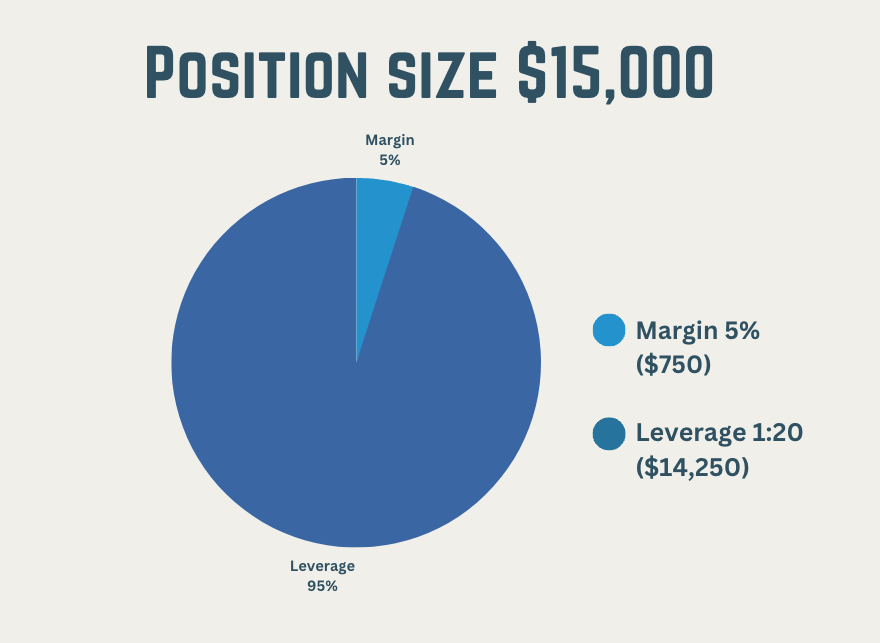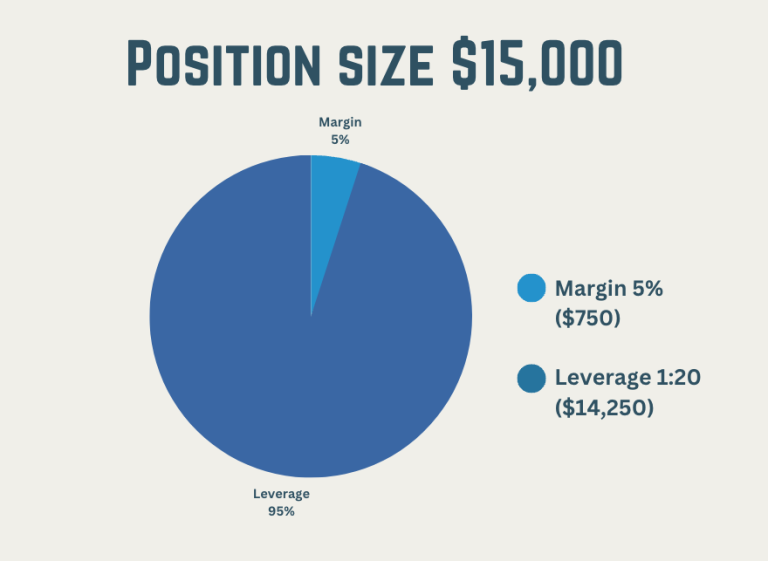Spread betting leverage and margin are combined to speculate on the spread of various markets such as forex, stocks, crypto, or commodities without owning the underlying assets.
Leverage and margin play a big role in spread betting and together they allow traders to speculate with much larger positions than what they would typically be able to afford.
In this article, I will explain what spread betting leverage and margin is, the difference between them, and how they work together to power up traders with small accounts.
Key takeaways
- Spread betting credit is the added purchasing power that is received from the broker and is measured in the ratio of 1:10, 1:50, or 1:100 for example.
- Spread betting margin is the capital that is deposited into the account and is what counts towards the margin requirement for opening a trade.
- Together, leverage and margin create the full position size where one part is received from the spread betting broker while the deposited money is added by the trader.
What is spread betting leverage?


Leverage is the borrowed money that you receive from your spread betting broker and is automatically added to your bet once you enter the position.
It is the borrowed money that is the secret ingredient that lets you control much larger positions even if your initial investment is relatively small.
A deposit of only $200 combined with a 1:20 ratio increases your position size to $4000.
This is a useful tool for spread betters who already have experience and can execute winning bets regularly.
How leverage works in spread betting
Leverage in spread betting works by allowing you to control a larger position size than your initial deposit.
This is possible by borrowing funds from your broker, almost like a small loan.
This increases your purchasing power and you can regulate the amount of money you want to receive by changing the ratio.
A ratio of 1:50 would increase your position size by 50 times the value of your collateral money.
Let’s say that if you deposit $500 and use 50x multiplier your total position size would be worth $25,000.
The conclusion of this is that even a small account can make significant profits from a minor price movement.
Advantages of leverage in spread betting
Below are some of the main advantages of leveraging your account in spread betting:
- Increased buying power – With a leveraged position or bet in the market you stand to make a lot more money than you typically would with your standard account. It is not uncommon to see traders profit up to $5000 in one single trading day with an account size of $800.
- Great flexibility – Another factor that is often overlooked is the flexibility that credit gives you when speculating. You can spread out the margin capital in your account to trade several positions at the same time which can be used to execute several spread betting strategies at once with the same initial stake.
- Smaller capital requirement – Leverage allows traders with underfunded accounts to make similar profits to bigger traders. A good leverage for a micro account is typically around 1:2 – 1:10 depending on your skill level.
- Short selling – Spread betting lets you short sell with leverage which means that you can make money by betting on falling prices. A helpful tool when shorting is to use our short selling calculator.
Disadvantages of leverage in spread betting
There are of course some risks to using borrowed funds when spread betting, these include:
- Increased risk – The risk is amplified to the same extent as profits. Your account PnL will fluctuate down just as up and your leveraged losses will increase the loss per point.
- Margin calls – All margin-based accounts are at risk of a margin call if the capital balance falls below the required level. Some spread betting brokers require up to 20% of the trade value to come from your pocket. Should your capital fall below this 20% threshold your broker will automatically warn you.
- Complexity – Leveraged products can be more difficult to understand as you need to understand how the dynamic between these concepts works. Many traders tend to overleverage which can cause unexpected losses.
- Reduced control – Most beginners will feel out of control at first since the volatility of the market can be overwhelming. My recommendation is to learn good leverage risk management before starting.
What is spread betting margin?
Margin is spread betting is essentially the minimum deposit that the broker requires for you to open positions.
It acts as collateral for the borrowed money you receive when you enter the market.
Your deposit can be as small as $10, it all depends on the requirements of the spread betting broker you are trading with.
For example, if the margin requirement is 10%, and you want to open a position worth $50,000, the collateral deposit with be $5000.
Keep in mind that this is not a fee, it is simply the balance that you maintain in your account to open positions.
Once you have made the initial deposit, you can choose how much capital you want to spend on each trade.
It is important to read the requirements of each platform you trade with since they all have different conditions.
How margin works in spread betting
Your balance is your own money and all your profits and losses and added or deducted from this amount.
The margin is also included in the calculation of the full position size together with leverage.
The full size of a spread bet is made with this formula:
Margin * Leverage = Position value
The capital value is always much smaller than the total position size since it is usually only a fraction of the total value.
This is one of the reasons why spread betting is offered to such a big audience, nearly anyone can get started with a small balance.
How margin and leverage work together
It is the combination of margin and leverage that makes spread bets tick and one can not exist without the other.
It works much the same way as a mortgage or a car loan where you put down a collateral amount to receive a larger sum.
Here your own money is called the margin and the money your broker lends to you is called the credit.
Together they create a way of speculating on global markets without owning the underlying asset.
Most spread betting brokers have mirrored prices much the same way as CFD brokers.
Example of leverage and margin in spread betting
Let’s say that you have $5000 in your spread betting account and you want to trade FTSE.
FTSE is currently trading at 7,000 points and the margin requirement of your broker is 10%.
At a margin requirement of 10%, you would need to deposit $700 as a balance.
Now, suppose you open one FTSE position and the market pushes higher during the day and the FTSE index ends up at 7,100.
Your position would profit $100 once it is closed which is a 14,28% profit.
However, should the FTSE fall to 6,900, your spread bet would lose the same amount, $100.
In this example, you can see how spread betting leverage and margin can give you increased buying power and the potential for higher returns.
It is also worth mentioning that there are always increased risks associated.
Use our spread betting calculator to find out the profitability of your spread bet.
Margin calls in spread betting
A margin call is a request from your broker to add more funds into your spread betting account to increase the capital balance to the required level.
This happens when your losses have grown too big and your account is at risk of liquidation by leverage.
A margin call can be triggered by a sudden drop in the markets caused by an unexpected news event or simply by using too much credit.
It is a safety system that most brokers have that protects you from losing more money than you have invested.
The margin call is essentially for protecting both the trader and the broker from the account going into debt.
This can happen if the broker doesn’t have a negative balance protection and your losses get out of hand.
It is important to monitor your capital levels to stay on the safe side.
Margin requirements
Margin requirements in spread betting refer to the amount of capital that must be deposited in order to open a bet.
This is a form of collateral that brokers have added as a downpayment to receive the borrowed funds.
The margin requirement is typically a percentage of the overall spread bet value.
For example, should you open a position worth $25,000, and the requirement is 5%, you are then obligated to maintain at least $1250 in your account.
This system is designed to let traders trade with a certain amount of capital that is not too risky.
Brokers make money from leverage when a trade is opened and closed through the leverage fee.
Should a trader overleverage and liquidate the account balance immediately from overleveraging the broker has lost income on that trader.
At any given time when trading, keep an eye on your current capital level to stay within risk limits.
Spread betting without leverage
In spread betting, it is possible to trade without leverage to further eliminate the risk of losing money.
In this case, a margin requirement is not necessary since your total cash balance will act as risk capital.
Your purchasing power will be greatly reduced and the maximum position size will be based on the amount of money you deposit into your account.
The downside to not using credit is of course greatly reduced profits and less flexibility to trade several markets at the same time.
Traders with a limited amount to put up with will struggle to make decent profits.
Traders who don’t feel comfortable with the elevated risk factors might be better off spread betting without borrowed capital.
This will give you more control and it is at the same time a more simple approach.
Wrapping it up
In conclusion, spread betting leverage and margin are what fuel larger returns that most traders are looking for.
This is also the combination that causes the biggest risks among beginner traders who don’t fully understand the relationship between them.
Each spread betting broker has a margin requirement and it is up to each trader to maintain a safe level of margin to not get issued a margin call.
This can be done by either using less credit or a good risk management strategy.
The option to spread bet without leverage is of course available, however, this significantly reduces the purchasing power of your positions.


